This Week in Labor History
January 15
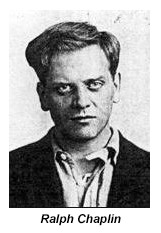 Wobbly Ralph Chaplin, in Chicago for a demonstration against hunger, completes the writing of the labor anthem “Solidarity Forever” on this date in 1915. He’d begun writing it in 1914 during a miners’ strike in Huntington, W. Va. The first verse: Wobbly Ralph Chaplin, in Chicago for a demonstration against hunger, completes the writing of the labor anthem “Solidarity Forever” on this date in 1915. He’d begun writing it in 1914 during a miners’ strike in Huntington, W. Va. The first verse:
When the union’s inspiration through the workers’ blood shall run,
There can be no power greater anywhere beneath the sun;
Yet what force on earth is weaker than the feeble strength of one,
But the union makes us strong! – 1915
Seventeen workers in the area die when a large molasses storage tank in Boston’s North End neighborhood bursts, sending a 40-foot wave of molasses surging through the streets at an estimated 35 miles per hour. In all, 21 people died and 150 were injured. The incident is variously known as the Boston Molasses Disaster, the Great Molasses Flood and the Great Boston Molasses Tragedy. Some residents claim that on hot summer days, the area still smells of molasses – 1919
Martin Luther King Jr. born – 1929
 (All Labor Has Dignity: Dr. King was every bit as committed to economic justice as he was to ending racial segregation. He fought throughout his life to connect the labor and civil rights movements, envisioning them as twin pillars for social reform. King’s speeches on labor rights and economic justice underscore his relevance for today. They help us imagine King anew: as a human rights leader whose commitment to unions and an end to poverty was a crucial part of his civil rights agenda.) (All Labor Has Dignity: Dr. King was every bit as committed to economic justice as he was to ending racial segregation. He fought throughout his life to connect the labor and civil rights movements, envisioning them as twin pillars for social reform. King’s speeches on labor rights and economic justice underscore his relevance for today. They help us imagine King anew: as a human rights leader whose commitment to unions and an end to poverty was a crucial part of his civil rights agenda.)
The CIO miners’ union in the Grass Valley area of California strikes for higher wages, union recognition, and the 8-hour day. The strike was defeated when vigilantes and law enforcement officials expelled 400 miners and their families from the area – 1938
 The Pentagon, to this day the largest office building in the world, is dedicated just 16 months after groundbreaking. At times of peak employment 13,000 workers labored on the project – 1943 The Pentagon, to this day the largest office building in the world, is dedicated just 16 months after groundbreaking. At times of peak employment 13,000 workers labored on the project – 1943
Some 174,000 members of the United Electrical, Radio and Machine Workers union (UE) struck General Electric and Westinghouse after the power companies, with record-setting profits, offered just a half-cent per hour increase. After nine weeks, the strike was settled with an 18.5 cents hourly wage improvement – 1946
January 16
The United States Civil Service Commission was established as the Pendleton Act went into effect – 1883
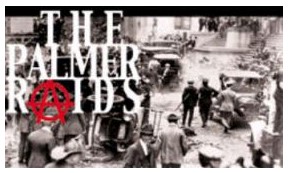 Thousands of Palmer Raids detainees win right to meet with lawyers and attorney representation at deportation hearings. “Palmer” was Alexander Mitchell Palmer, U.S. attorney general under Woodrow Wilson. Palmer believed Communism was “eating its way into the homes of the American workman,” and Socialists were causing most of the country’s social problems – 1920 Thousands of Palmer Raids detainees win right to meet with lawyers and attorney representation at deportation hearings. “Palmer” was Alexander Mitchell Palmer, U.S. attorney general under Woodrow Wilson. Palmer believed Communism was “eating its way into the homes of the American workman,” and Socialists were causing most of the country’s social problems – 1920
Former UAW President Leonard Woodcock dies in Ann Arbor, Mich., at age 89. He had succeeded Walter Reuther and led the union from 1970 to 1977 – 2001
January 17
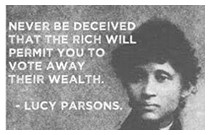 Radical labor organizer and anarchist Lucy Parsons leads hunger march in Chicago; IWW songwriter Ralph Chaplin wrote “Solidarity Forever” for the march – 1915 Radical labor organizer and anarchist Lucy Parsons leads hunger march in Chicago; IWW songwriter Ralph Chaplin wrote “Solidarity Forever” for the march – 1915
President John F. Kennedy signs Executive Order 10988, guaranteeing federal workers the right to join unions and bargain collectively – 1962
January 18
U.S. Supreme Court rules in Moyer v. Peabody that a governor and officers of a state National Guard may imprison anyone—in the case at hand, striking miners in Colorado—without probable cause “in a time of insurrection” and deny the person the right of appeal – 1909
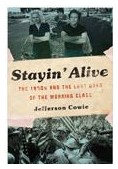 “Take This Job and Shove It,” by Johnny Paycheck, is listed by Billboard magazine as the most popular song in the U.S. – 1978 “Take This Job and Shove It,” by Johnny Paycheck, is listed by Billboard magazine as the most popular song in the U.S. – 1978
(Stayin’ Alive: The 1970s and the Last Days of the Working Class is a remarkable account of how working-class America hit the rocks in the political and economic upheavals of the 1970s.)
January 19
Twenty strikers at the American Agricultural Chemical Co. in Roosevelt, N.J., were shot, two fatally, by factory guards. They and other strikers had stopped an incoming train in search of scabs when the guards opened fire – 1915
Some 3,000 members of the Filipino Federation of Labor strike the plantations of Oahu, Hawaii. Their ranks swell to 8,300 as they are joined by members of the Japanese Federation of Labor – 1920
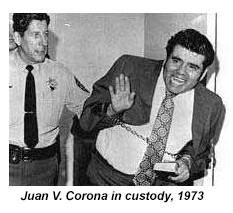 Yuba City, Calif., labor contractor Juan V. Corona found guilty of murdering 25 itinerant farm workers he employed during 1970 and 1971 – 1973 Yuba City, Calif., labor contractor Juan V. Corona found guilty of murdering 25 itinerant farm workers he employed during 1970 and 1971 – 1973
Bruce Springsteen makes an unannounced appearance at a benefit for laid-off 3M workers, Asbury Park, N.J. – 1986
January 20
Chicago Crib Disaster—A fire breaks out during construction of a water tunnel for the city of Chicago, burning the wooden dormitory housing the tunnel workers. While 46 survive the fire by jumping into the frigid lake and climbing onto ice floes, approximately 60 men die, 29 burned beyond recognition and the others drowned – 1909
American Civil Liberties Union (ACLU) founded – 1920
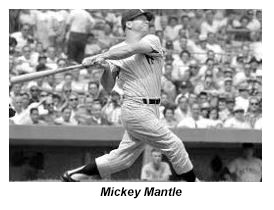 Hardworking Mickey Mantle signs a new contract with the New York Yankees making him the highest paid player in baseball: $75,000 for the entire 1961 season – 1961 Hardworking Mickey Mantle signs a new contract with the New York Yankees making him the highest paid player in baseball: $75,000 for the entire 1961 season – 1961
Bruce Springsteen’s “My Hometown,” a eulogy for dying industrial cities, is the country’s most listened-to song. The lyrics, in part: “Now Main Street’s whitewashed windows and vacant stores / Seems like there ain’t nobody wants to come down here no more / They’re closing down the textile mill across the railroad tracks / Foreman says these jobs are going boys and they ain’t coming back to your hometown / Your hometown / Your hometown / Your hometown…” – 1986
January 21
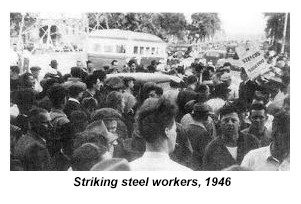 Some 750,000 steel workers walk out in 30 states, largest strike in U.S. history to that time – 1946 Some 750,000 steel workers walk out in 30 states, largest strike in U.S. history to that time – 1946
Postal workers begin four-day strike at the Jersey City, N.J., bulk and foreign mail center, protesting an involuntary shift change. The wildcat was led by a group of young workers who identified themselves as “The Outlaws”- 1974
Six hundred police attack picketing longshoremen in Charleston, S.C. – 2000
—Compiled and edited by David Prosten |